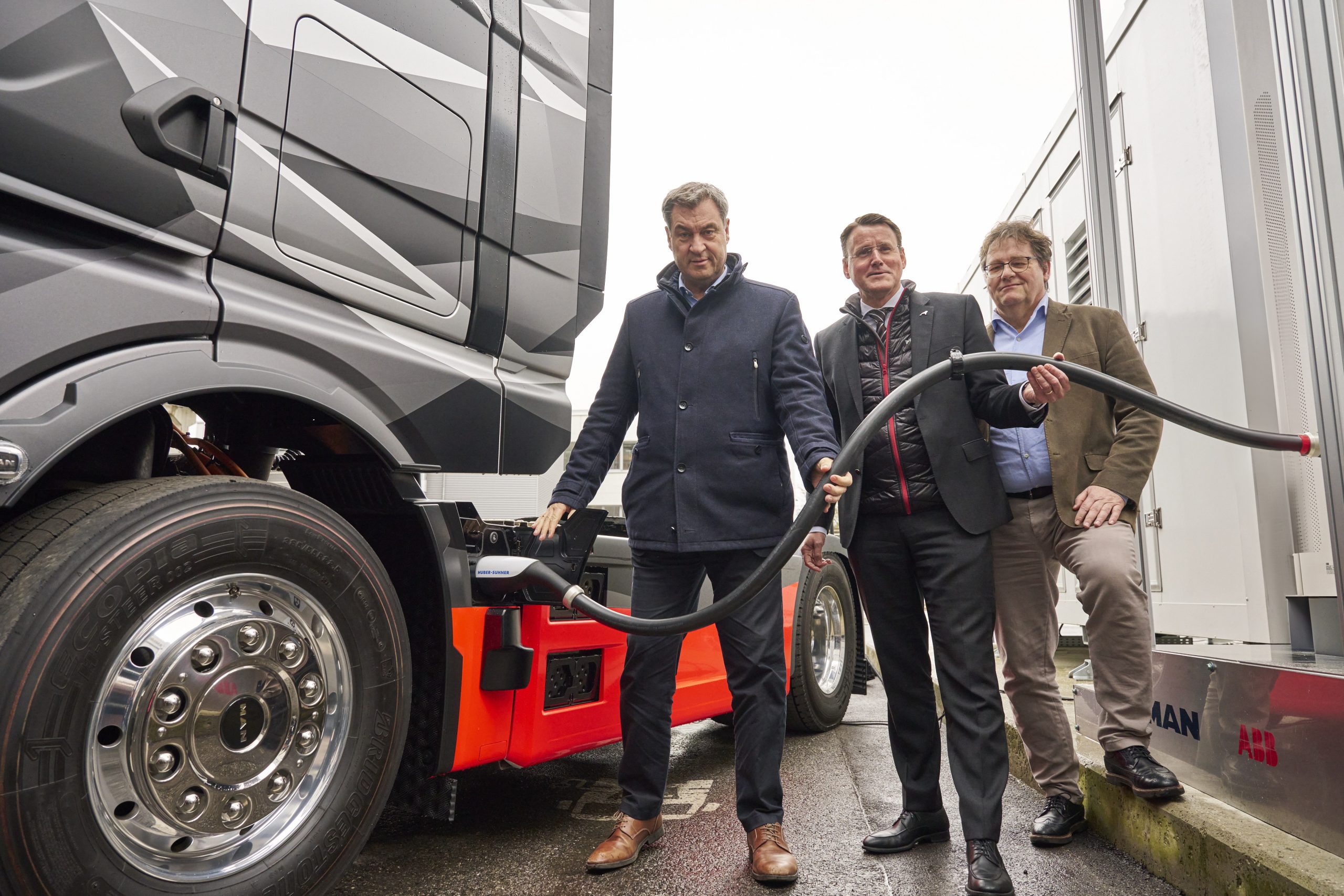 Bei der MCS-Ladepremiere in München: Dr. Markus Söder, Bayerischer Ministerpräsident, Alexander Vlaskamp, CEO MAN Truck & Bus, und Michael Halbherr, CEO ABB E-mobility.
Bei der MCS-Ladepremiere in München: Dr. Markus Söder, Bayerischer Ministerpräsident, Alexander Vlaskamp, CEO MAN Truck & Bus, und Michael Halbherr, CEO ABB E-mobility.
Last Thursday, ABB E-mobility and MAN Truck & Bus celebrated the premiere of their megawatt charging system (MCS) in the presence of Bavarian Minister President Dr. Markus Söder. The MAN eTruck was charged with more than 700 kW and 1,000 A at an MCS charging station from ABB E-mobility. Dr. Markus Söder, Bavarian Minister President: “Bavaria on the road to the mobility of the future: today marks the launch of the first megawatt charging station for electric trucks at MAN in Munich. This is state-of-the-art ecological and economical e-mobility that is being developed in Bavaria. We have to put our domestic industry in a position to compete. Innovation and technology secure the future.”
Megawatt charging was the starting signal for an elementary component of the mobility transition in the commercial vehicle sector towards climate-friendly mobility and the successful electrification of buses and trucks. Especially in national and international long-distance transport or in loading and unloading situations, electric trucks and, in the future, electric coaches require a fast MCS booster during the legally prescribed driving time break. The new technology therefore complements existing solutions: Charging in depots with lower charging capacities will continue to play a central role in the future.
The two companies have demonstrated at MAN’s development center in Munich that MCS charging already works today. One of the first megawatt charging stations in Germany has been installed there by ABB E-mobility. “With MCS, sustainable long-distance transportation with trucks and buses will be possible in the near future. We have proven that today. Even if we are still showing a prototype here: With the new MCS standard, we have not only doubled the current strength but also the charging capacity within just a few years. To achieve the energy transition in transportation, we need solutions that are sustainable, reliable and economical. To achieve this, we need to think integratively and work together. Today’s demonstration is also the result of close cooperation between MAN and ABB E-mobility and the entire industry,” said Michael Halbherr, CEO of ABB E-mobility.
Alexander Vlaskamp, CEO of MAN Truck & Bus, reiterated his call for more speed in the expansion of the charging infrastructure during the premiere of megawatt charging: “The target is 30,000 MCS charging points in Europe by 2030, around 4,000 of them in Germany. Today we put one of the first charging points into operation. We don’t have much time left to set it up. The electric trucks are available, megawatt charging is working. We now need clear signals from politicians, not least to build trust among our customers for electrification. We now need to build and scale up the infrastructure quickly.”
The new megawatt charging standard MCS is technically designed for charging capacities of up to 3.75 MW at 3,000 amperes (A). Today, ABB E-mobility and MAN have demonstrated more than 700 kW charging power with prototype charging technology. With the finalization of the MCS standard, charging capacities of over one megawatt will already be possible. This will result in a significant improvement in charging times. For comparison: current charging stations with the CCS standard (Combined Charging System) can be used by cars and commercial vehicles and offer a maximum charging capacity of 400 kW at 500 A. The international standardization process for the Megawatt Charging System is expected to be completed this year. ABB E-mobility and MAN have contributed their know-how to the creation of the MCS standard in the international industry association CharIN.
The fact is, a lot of energy is needed for MCS charging. When so much electricity is flowing, the infrastructure behind the visible charging points, the grid connections and the space requirements, e.g. at highway service stations, parking lots or truck stops, play a key role. Grid expansion and the digitalization of the grids are not only essential for the future supply of renewable energy, but also a prerequisite for the charging infrastructure.